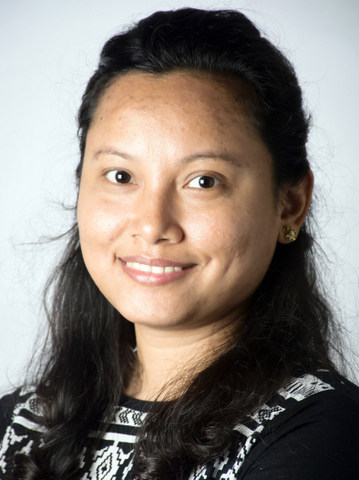C4D grants awarded
 Cristina Gallegos and Jharna Brahma have been awarded research grants from the UNICEF/IAMCR Communication for Development Research Fund to support research projects that will advance our understanding of how Communication for Development (C4D) contributes to the United Nations Sustainable Development Goals (SDGs). The awards, worth USD 4,000 each, are funded by UNICEF and managed by IAMCR.
Cristina Gallegos and Jharna Brahma have been awarded research grants from the UNICEF/IAMCR Communication for Development Research Fund to support research projects that will advance our understanding of how Communication for Development (C4D) contributes to the United Nations Sustainable Development Goals (SDGs). The awards, worth USD 4,000 each, are funded by UNICEF and managed by IAMCR.
The fund supports research that can link to the work of the Global Alliance for Social and Behaviour Change (GASBC), a coalition of organisations from diverse fields, united by a common commitment to building informed and engaged societies. UNICEF and IAMCR are founding members of the Alliance.*
Cristina and Jharna will receive cash support, mentoring, and the coordination of a peer review of the final papers. They will present their work at IAMCR's 2020 conference in Beijing and will discuss their work at webinars open to members of the UNICEF and IAMCR communities.
Cristina Gallegos is an Ecuadorian national currently living and working in Rwanda. She will explore the human/environment social practices for sustainable development that emerge from a participatory communication for development radio intervention in a low-income community in Rwanda. The selection committee was impressed with the proposal’s thoroughness, commenting that it was an excellent response to the objectives of the call for proposals.
 Jharna Brahma, currently pursuing a PhD at the University of Hyderabad in India, will examine Forum theatre as a participatory communication tool for mobilizing communities in realizing SDGs at the local level in the context of rural India. The selection committee described it as a "wonderfully practical and feasible project embedded in a larger theoretical context."
Jharna Brahma, currently pursuing a PhD at the University of Hyderabad in India, will examine Forum theatre as a participatory communication tool for mobilizing communities in realizing SDGs at the local level in the context of rural India. The selection committee described it as a "wonderfully practical and feasible project embedded in a larger theoretical context."
IAMCR and UNICEF offer their enthusiastic congratulations to Cristina and Jharna and their sincere thanks to the members of the selection committee. More than thirty eligible proposals were received for the two grants, making the work of the selection committee, which applied a rigorous process using clear indicators, particularly difficult.
Summary of Cristina Gallegos’ project
The research seeks to understand how social practices form in response to a participatory communication for development program (UNICEF ltetero). It will explore how social practices engage participants to maintain and strengthen them via a radio program listening club, and how the participants give meaning and are encouraged to deflect to more environmentally sustainable practices. Specifically this project will monitor the emergence of environmentally sustainable social practices, through the radio program listening club, which brings together between 6 and 10 participants each week. This research, grounded in social practice theory, will help to build the evidence base on sustainable positive behaviour change in low-income communities. It is part of a series of case studies for a PhD program (Strategic Communication) at Wageningen University in affiliation with the University of Rwanda (Eastern and Southern Africa).
Maria Cristina Gallegos' passion for research in communication for development for social and behavior change is both professional and borne from a life-time in the developing world. Cristina is driven to effect change in countries with critical needs and fragile habitats. She has lived in El Salvador, Ecuador, Dominican Republic, Bulgaria, USA and is now residing in Rwanda. She has actively worked in the protection and empowerment of indigenous people, disability, women and youth rights, and now environmental sustainability.
Summary of Jharna Brahma's project
The proposed ethnographic study is an examination of forum theatre as a communication process for social change in rural West Bengal in India. More specifically, it explores how this form of theatre can contribute to addressing the Sustainable Development Goals (SDGs) at the community level. Forum Theatre (FT) is a participatory form of theatre developed by the Brazilian theatre activist Augusto Boal in the 1970s, with the aim of emancipating and empowering the poor and the oppressed. This was adapted and further improvised by Sanjoy Ganguly, who founded Jana Sanskriti, a group that works primarily in the Sunderbans and Purulia regions of the state of West Bengal.
Her preliminary work in interior villages has shown how forum theatre equips people to become social critics, to communicate and negotiate with their oppressors, and facilitate community mobilization for real socio-political actions. The study hopes to unravel FT’s bottom-up, participatory and democratic approach and its capacity to bring about change at the individual and social levels.
Jharna Brahma is a doctoral student in Communication at the University of Hyderabad, India, and associated with the UNESCO Chair on Community Media. After obtaining her Master’s in Communication from Assam University, she worked in the area of public health communication for five years. She was then engaged as a research associate with an international collaborative project on C4D Evaluation with RMIT University, Australia and the University of Hyderabad for three years.
*To learn more about the Global Alliance for Social and Behaviour Change please visit www.globalallianceSBC.org. IAMCR members interested in the work of our Task Force on the Global Alliance can contact the co-chairs, Elske van de Fliert [contact] and Thomas Jacobson [contact].
Members of the Selection Committee:
- Elske van de Fliert (Chair), The University of Queensland, Australia | IAMCR GASBC Taskforce
- Thomas Jacobson, Temple University, USA | IAMCR GASBC Taskforce
- Charlotte Lapsansky, UNICEF, USA | UNICEF
- Martine Najem, The American University of Beirut, Lebanon | GASBC
- Vinod Pavarala, University of Hyderabad India | IAMCR membership
- Bruce Girard (non-voting), IAMCR, Uruguay | IAMCR Executive Secretariat